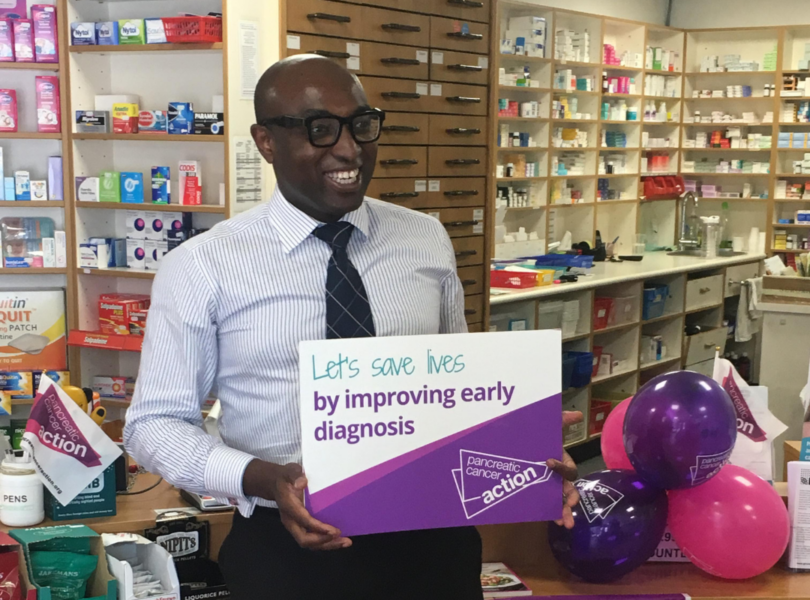Can you Turn it Purple in your pharmacy?
Help us to raise awareness in your pharmacy by taking part in Turn it Purple this November. Click here to order your free pack now!
Our pharmacy ambassador Ade Williams, explores the detrimental effects that COVID-19 has had on pancreatic cancer patients, including those facing health inequalities as a result of their socioeconomic and racial background. He highlights the vital role that community pharmacies, like his own, play in advising and supporting their local community members and why pharmacists must play a key role in overcoming the current crisis.

I now make a weekly call to a single middle-aged patient of mine. We deliberately discuss nothing – Christmas card list, how will the late autumn affect bird migration. COVID-19’s hitherto unimaginable impact, few of which we will cherish.
Time has now morphed from a montage of events to static slides with images and events etched into our minds and sometimes hearts. Many of them distressing. My weekly conversation is such for me. My patient lost his wife to cancer during the pandemic. She was diagnosed and died within a very short time- six weeks. Cancer.
At any more normal time this would be a big shock but this only helps in a small part to grasp what he and many others are going through including many health care professionals and patient advocacy groups like Pancreatic Cancer Action.
Alongside his grief, loneliness and heartbreak is a frustration. He so much wanted to do more. We all want to do more, and COVID-19 has shown us why.
So many people in our society suffer from health inequalities simply because of their socio-economic status and racial background. Even though COVID-19 has decimated all its path, the vulnerability of such individuals has gained universal visibility. Our collective frustration is that we knew about this before, but the urgency to address this now especially with regards cancer care, where early diagnosis, alongside quick and easy access to treatment pathway, is our one good hope can not be a delayed with any day longer.
It is sobering to think that as a result, of COVID-19, less people have been referred for pancreatic cancer and survival is likely to have been impacted. So now more than ever before we need to be part of the urgent change needed. Community pharmacy is coming through the pandemic has one of the pillars of our National Health Service. This is not a new role.
As the most accessible part of the system, bridging health and social care, we are the NHS outpost embedded and equipped to facilitate health and wellbeing provision. The scale of our collective commitment to this, working with other health and social care colleagues has humbled me.
As we now look to move from our frustration to doubling down to tackle the scale of the challenges- community pharmacy must alongside other health care professionals and organisations like Pancreatic Cancer Action work tirelessly in our communities especially those that are hardest to reach.
Statistically, most community pharmacies are located here, so can provide disease awareness and education, risk-reducing lifestyle behavioural support, advocacy for early diagnosis through investigative protocols and medicine optimisation care for any treatment options or side effects. We are also best placed to help manage the emotion toll of pancreatic cancer-related anxiety, diagnosis and treatment for patients, and their loved ones. The education and training resources from Pancreatic Cancer Action will help facilitate this in a team lead consistent manner.
Our communities need our help to overcome this crisis in cancer care- Pancreatic Cancer Action has always said pharmacy is a vital part of the solution, even more so now. To further harness our clinical expertise and enable us to address the urgency of the situation the NHS faces, pharmacists must now also be able to make urgent cancer referrals using evidence-led decision support tools.
Sadly during COVID-19 pancreatic cancer, like other cancers, has not stood still. My patient and I know this. The value of our weekly chats though limited, at this time of mandated social isolation, is critical.
With early cancer diagnosis part of the directed enhanced service specifications of Primary Care Networks (PCN), we offer an integrated solution to an acknowledged population health need. Now is the time for community pharmacy to come together, partner with Pancreatic Cancer Action and be part of this collective effort to tackle health inequalities which sadly pancreatic cancer is another part of.